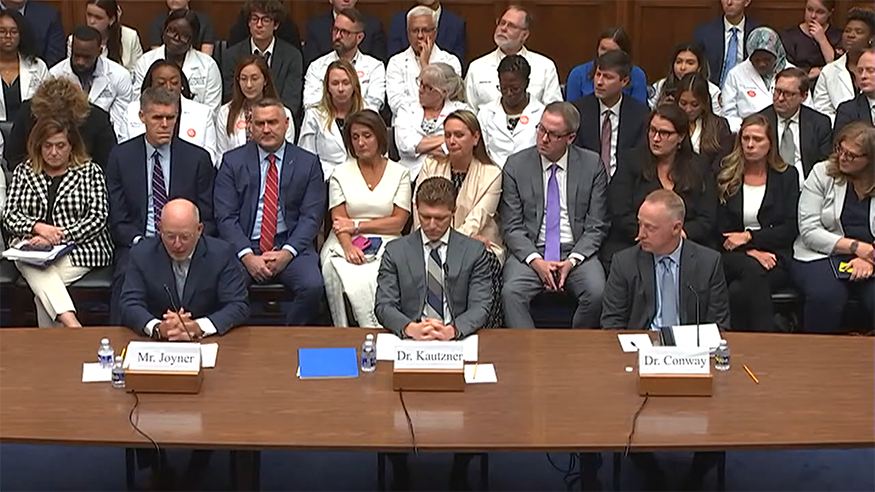The heads of the three largest pharmacy benefit managers (PBMs) were grilled on July 23 by the House Oversight and Accountability Committee, whose new report found “PBMs inflate prescription drug costs and interfere with patient care for their own financial benefit.”
The Oversight Committee released their report just before hearing testimony from the PBM executives: Adam Kautzner, PharmD, President of Evernorth Care Management & Express Scripts; David Joyner, President of CVS Caremark and Executive Vice President of CVS Health; and Patrick Conway, MD, CEO of OptumRx.
Together, the three PBMs process approximately 80% of all prescriptions in the U.S.
“The three largest PBMs have used their position as middlemen and integration with health insurers, pharmacies, providers, and recently manufacturers, to enact anticompetitive policies and protect their bottom line,” the report found.
“These self-benefitting pricing tactics pushed by PBMs have done nothing but jeopardize patient care, undermine local pharmacies, and raise prescription drug prices,” said a July 23 statement from Committee Chair James Comer (R-KY). “The three largest pharmacy benefit managers colluded to line their own pockets.”
‘That is a 38,000% markup’
The PBM leaders faced bipartisan criticism and tough questions on July 23, as Republicans and Democrats called for reform during the Oversight Committee’s third hearing on PBMs since last year.
The PBM leaders defended their organizations, saying they work to lower drug costs and provide affordable prescriptions by negotiating with drug makers. All three emphasized a commitment to transparency. CVS Caremark President Joyner highlighted his company’s TrueCost model, which seeks to increase transparency.
Their statements were met with skepticism.
Rep. Jake Auchincloss (D-MA) said he did some of his own investigation on markups, comparing data from CVS Caremark TrueCost and Medicaid’s National Average Drug Acquisition Cost (NADAC). Although Joyner told him the TrueCost price would be lowest, Rep. Auchincloss listed several drugs with markups of more than 4,000%. He noted that Teriflunomide, used to treat multiple sclerosis, cost $6,229 from CVS Caremark TrueCost though the NADAC price was $16.
“That is a 38,000% markup,” Rep. Auchincloss said.
PBMs ‘are the worst kind of middlemen’
Other Members of Congress questioned the claims that PBMs save patients money.
“Pharmacy benefit managers today are the worst kind of middlemen,” said Rep. Katie Porter (D-CA). “You stop competition, you prevent transparency, you manipulate markets, and you make our health care system more complicated.”
Rep. Buddy Carter (R-GA) said the vertical integration of PBMs with insurers and pharmacies hurts independent pharmacies and is a potential conflict of interest. He cited a recent FTC report finding evidence that “your three companies are steering patients toward their own pharmacy.” He expressed doubt when the three executives denied the practice and called PBM operations “despicable.”
Chair Comer also called out vertical integration: “I would certainly support busting up the PBMs. I don’t think a PBM should be owned by a health insurance company. I don’t think a PBM should own a pharmacy.”
Other Committee members noted that PBMs had created group purchasing organizations (GPOs) in foreign countries, suggesting this could be a tactic to avoid U.S. regulations and taxes. Rep. Virginia Foxx (R-NC) noted that these GPOs “received roughly $7.6 billion in fees from drug manufacturers in 2022.” She said the bipartisan Lower Costs, More Transparency Act, which she co-sponsored, would require PBMs to disclose fees they receive through GPOs.
In closing, Chair Comer called for further PBM reform legislation and expressed interest in working on this with House Energy and Commerce Health Subcommittee Chair Brett Guthrie (R-KY).
Oversight Committee report calls for PBM legislation
The report that the Oversight Committee released July 23 called for legislation.
“Congress and states must implement legislative reforms to increase the transparency of the PBM market and ensure patients are placed at the center of our health care system, rather than PBMs’ profits,” said the report, which also highlights several state and federal legislative proposals.
Among the findings:
- “PBMs frequently tout the savings they provide for payers and patients through negotiation, drug utilization programs, and spread pricing, even though evidence indicates that these schemes often increase costs for patients and payers.”
- “As many states and the federal government weigh and implement PBM reforms, the three largest PBMs have begun creating foreign corporate entities and moving certain operations abroad to avoid transparency and proposed reforms.”
- “The largest PBMs’ use of tools such as prior authorizations, fail first policies, and formulary manipulations have significant detrimental impacts on Americans’ health outcomes.”
- “The anti-competitive policies of the largest PBMs have cost taxpayers and reduced patient choice.”




